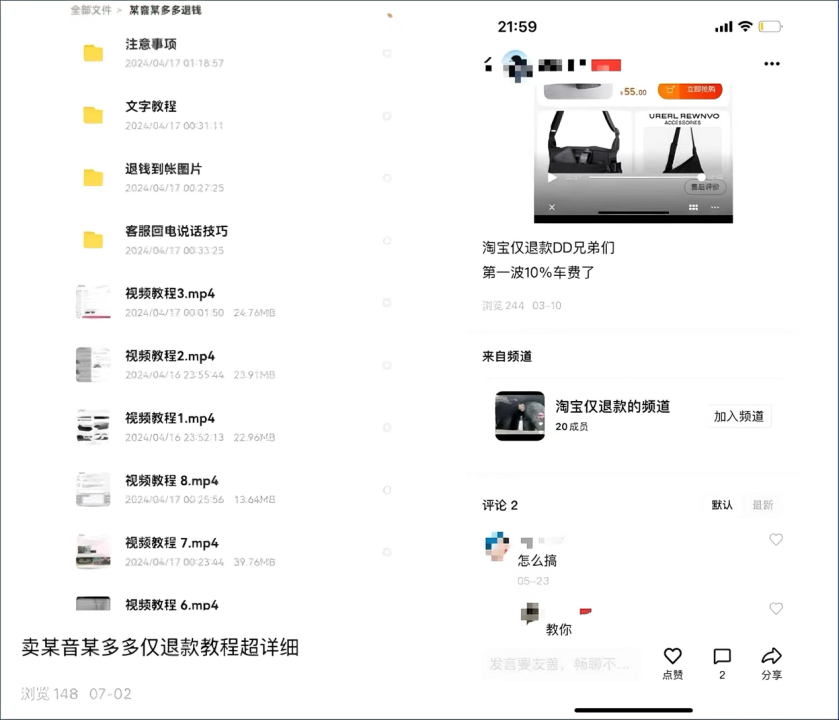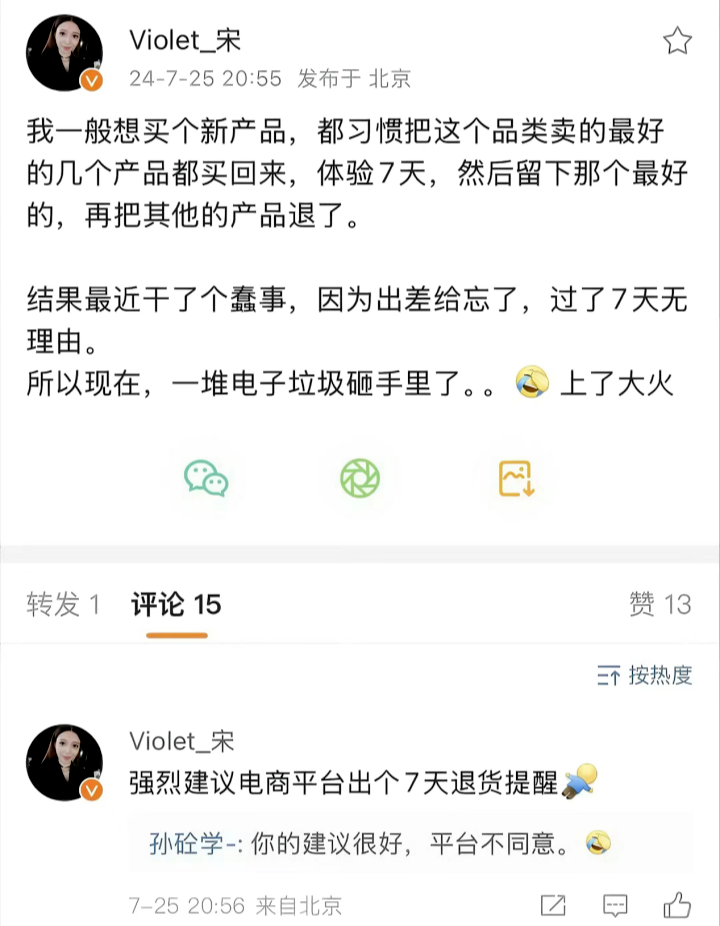Who are really hurt by malicious refunds?
![]() 08/06 2024
08/06 2024
![]() 561
561

Abusing rules, or even turning "no reason" into "unreasonable" behavior, hurts merchants, infringes upon the rights and interests of ordinary consumers, and violates the original intention of the platform.
The group engaging in "malicious refunds" ignores the trusted trading environment of e-commerce platforms, infringes upon the normal operating interests of merchants and platforms, and ultimately harms the shopping rights and interests of ordinary consumers.
Recently, "Retail Business Finance" found on social media platforms that the phenomenon of "malicious refunds" has become increasingly serious. "Free-riders" frequently carry out premeditated, organized, and scripted "malicious refunds" with impure ordering motivations, mainly concentrated on JD.com's e-commerce platform. On Xiaohongshu, some users have shared incidents of frequently returning orders using JD.com's "7-day no-reason return" policy, placing and returning over 20 orders, mostly for induction cookers, even claiming "I can always use new ones every time."
It is understandable to apply for a return or exchange if you find the goods unsatisfactory after receiving them, but this incident is far from simple.
After investigation by netizens, it was revealed that this "return maniac" is an employee of Chengdu Xiangya Media Co., Ltd., whose business is suspected to be e-commerce live streaming. It was indicated that the products purchased were likely used for review shoots, and after the reviews were completed, they were returned using reasons such as "dislike" or "unsuitability," effectively achieving "zero-cost operations" by exploiting loopholes.
Whether it's a genuine "dislike for the product" or a "dislike for spending money," the answer is self-evident.
From taking advantage of the return function to wear "disposable" clothes for free to taking photos, to now batch returning products at the expense of others' interests, "malicious refunds" are no longer just improper means to satisfy personal desires; they have become a "gold mine" for speculators.
Media reports have exposed that "refund tutorials" for certain e-commerce platforms are sold on various social platforms for 5 yuan, including detailed written and video tutorials. Merchants are threatened into agreeing to refunds only through tough attitudes and templated scripts. Clearly, "wool-gatherers" have nurtured a complete black industry chain.

Image source: Internet
When the "malicious refund" group scales up, quantitative changes are bound to lead to qualitative changes. They use the platform's consumer protection rights as a weapon, mercilessly attacking platforms and merchants, violating the platform's original intention and harming merchants' interests.
Further extrapolation, who is the ultimate "buyer" after the costs of "malicious refunds" are transferred? This incident undoubtedly poses a "hidden danger" to the future normal shopping experience of ordinary consumers.
The law does not favor the rich or powerful, and the rope does not bend. For those who undermine the principle of integrity in commercial transactions, not only do platforms and merchants need to make efforts, but all consumers must jointly resist and maintain a fair and trustworthy e-commerce shopping atmosphere.

Rights, not weapons
"Malicious refunds" are not just a simple after-sales phenomenon; they reflect human nature's tendency to seek benefits and avoid harm, the maturity of market credit system construction, and have inadvertently given rise to negative phenomena of different purposes and scales.
One phenomenon is that due to extreme selfishness, trying to find ways to take advantage, and greed for small benefits, some individuals damage merchants' interests and increase their unnecessary operating costs.
Song Ziwei, former iQOO product manager and current executive at Lixiang Auto, stated on social platforms, "I am used to buying back the best-selling products in this category, experiencing them for 7 days, keeping the best one, and returning the rest." She even strongly recommended that e-commerce platforms implement a 7-day return reminder in the comments section.
Song Ziwei's transmission of "sophisticated egoism" is like a stone thrown into the water, causing ripples. Many netizens pointed out her inappropriate behavior in the comments. After public opinion fermented, Song Ziwei apologized, stating that her original intention was only to save costs and time, but she began to take advantage of the no-reason return policy, causing unnecessary burdens on merchants' operations.

Image source: Internet
Similarly, the Xiaohongshu user "A Xing" (nickname) is suspected of buying and returning a large number of high-priced induction cookers for e-commerce reviews. Little did she know that while reducing her own operating costs, she was also causing merchants to bear unnecessary logistics costs, product depreciation losses, and difficulties in resale.
Even more incredibly, after not executing the seven-day no-reason return policy on JD.com under the pretext of bulk purchases, "A Xing" posted an article expressing "grievances," staging a "the villain sues first" scenario.
A Xing's actions are not an isolated case, and malicious accusations from "A Xing's" like on social platforms are not uncommon. Some netizens stated that they bulk-purchased 12 products on JD.com but were unable to enjoy the no-reason return policy; others successfully returned three out of four phones purchased on JD.com but were refused a return for the last one...
Sensational headlines coupled with outrageous statements shocked netizens who understood the whole story in the comments section, with some even bluntly stating, "Your actions are a bit outrageous," "I don't want to be friends with you," and "Our consumer rights are being abused and destroyed by people like you."

Image source: Xiaohongshu
Another phenomenon is turning platform-granted rights into a "money-making machine" by organized and disciplined sale of "wool-gathering" tutorials on various platforms, taking so-called "business operations" as their responsibility, growing individual speculators into gangs, and expanding the black industry of "malicious refunds."
Clearly, abusing rules or turning "no reason" into "unreasonable" behavior, while beneficial in the short term, will severely damage the market credit system in the long run, leading merchants to raise prices or lower product quality to compensate for losses, ultimately harming consumer rights and reducing the overall shopping experience.
In fact, e-commerce platforms have made many upgrades and improvements to their return and refund after-sales services in recent years, striving to create a fair and harmonious trading atmosphere for "every consumer."
For example, when introducing after-sales services, JD.com's core focus is to enhance consumer rights protection and raise the competitive threshold for merchants. JD.com has clear enforcement standards and a merchant appeal mechanism, as well as reasonable constraints on consumer behavior. Taobao has also recently upgraded its "refund only" model, enhancing merchants' after-sales autonomy through experience scores and reducing or eliminating after-sales intervention for high-quality stores.
Of course, due to different group demands and means, coupled with the continuous iteration of malicious refund behaviors and tactics, e-commerce platforms face increasing difficulty in balancing the scales between merchants, ordinary consumers, and malicious refund groups, despite their unwavering intention to do so. Further, both e-commerce platforms and physical retail brands that also offer after-sales rights protection find it difficult to prevent such behaviors and adjust strategies in a timely manner.
Taking JD.com, which frequently appears on social media, as an example, precisely because its products are authentic, it has become the preferred choice for "wool-gathering." The platform must not only protect the interests of ordinary consumers and merchants but also constrain the behavior of some intentional individuals. What was intended to benefit consumers' shopping rights should not leave the platform struggling in a "bitter but unable to speak" vortex.

Who are really hurt?
In fact, amidst the discussions about the chaos of "malicious refunds" mentioned above, there are also abundant "sober voices" from ordinary consumers. However, as the phenomenon of "malicious refunds" intensifies, it severely impairs the shopping experience of ordinary consumers.
For example, when a large number of returned products flow back to merchants, who then sell these "used goods" to other consumers, leading ordinary consumers to receive used products. Just like the electronic products returned by Song Ziwei, the next consumer ultimately pays for her returns.
Secondly, the phenomenon of "malicious refunds" also increases merchants' vigilance, making them more cautious when facing bulk purchases from consumers in the future, potentially "harming" ordinary consumers who genuinely initiate returns due to product quality issues, leading to a long and arduous "path to rights protection" for the public.
Furthermore, as the scale of the "malicious refund" group grows larger, to achieve overall ecological balance, the platform will have to rebalance the scales between merchants' and consumers' rights. If the platform no longer offers more convenient after-sales services, won't ordinary consumers become the "secondary victims" of the "malicious refund" group?
It is thus evident that while "malicious refunds" affect merchants' and platforms' interests in the short term, it is the compliant and lawful ordinary consumers who are truly harmed in the long run.
No wonder ordinary consumers are now vigorously calling on "wool-gatherers" to stop their behavior and restore a healthy and friendly e-commerce shopping environment for platforms, merchants, and ordinary consumers alike.
After all, none of the participants in this current situation wish to encourage such a trend.
In fact, as a bridge connecting consumers and merchants, e-commerce platforms play a crucial role. The original intention behind introducing various after-sales services is to significantly enhance consumers' shopping experience, merchants' business effectiveness, and the shopping atmosphere on the platform.
Thanks to various after-sales services, consumers can eliminate the "uncertainty" of shopping, thereby safeguarding their property and transaction rights. Platforms and merchants that dare to make commitments can not only constrain their own business practices, subtly improve business quality, and promote healthy competition in the industry but also accumulate consumer goodwill, enhance user stickiness, and boost their own reputation.
What was originally a win-win situation for all three parties has been disrupted by a handful of people with ulterior motives.

Image source: Xiaohongshu
Borrowing a comment from Song Ziwei's comment section: Those who harm other users' rights for personal "petty gains" and take pride in it should not be forgiven.

As ordinary consumers, when we examine "malicious refunds," we are essentially defending our own rights.
A positive shopping atmosphere should not solely rely on platform efforts but require joint construction from all participants. The fair, transparent, harmonious, and trustworthy e-commerce ecosystem built by the platform also needs to be jointly guarded by all consumers.







